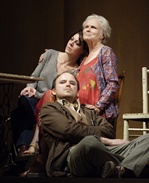SITE GUIDE
SEARCH
REVIEWS
REVIEW ARCHIVES
ADVERTISING AT CURTAINUP
FEATURES
NEWS
Etcetera and
Short Term Listings
LISTINGS
Broadway
Off-Broadway
NYC Restaurants
BOOKS and CDs
OTHER PLACES
Berkshires
London
California
New Jersey
DC
Connecticut
Philadelphia
Elsewhere
QUOTES
TKTS
PLAYWRIGHTS' ALBUMS
LETTERS TO EDITOR
FILM
LINKS
MISCELLANEOUS
Free Updates
Masthead
Writing for Us
A CurtainUp  London Review
London Review
 London Review
London ReviewThe Last of the Haussmans
|
"My childreb hate it when Iím sexual."
— Judy
|

Helen McCrory (Libby) Rory Kinnear (Nick) and Julie Walters (Judy) (Photo: Catherine Ashmore) |
Julie Walters is Judy the mother who went off to India, following a Maharishi type figure and living in an Ashram and the Devon house is brimming over with hippy mementoes, flags from India and CND insignia.
In the opening scene her thirty something son Nick (Roy Kinnear) a recovering drug addict and homosexual has been summoned home because Judy has just undergone an operation for cancer. Also there are her daughter in her forties, Libby (Helen McCrory) and her daughter the caustic and ill-named, 15 year old Summer (Isabella Laughland). Matthew Marsh is the local doctor and philanderer and Taron Egerton completes the cast as Daniel, Judyís attractive houseboy.
If Vicki Mortimerís revolving Art Deco house set is symbolic of the nation, this house is over stuffed and under cared for with dirty windows and tat everywhere. Judy may have developed her spirituality but she hasnít done a good job as a mother or as an economic provider. She left the children with their intolerant grandfather while she went to India. If Libby and Nick have turned up to stake a claim on their dying motherís house, they will be disappointed because in an act symbolic of everything else about Judy Haussman, she has sold the family silver, the house, to a company which releases the equity on homes and leaves nothing for the children. She still has her rebellious spirit as she rails against the richer neighbours who of course find her home unsightly and a health hazard.
Although there is much to laugh at in Beresfordís witty dialogue, the overarching feel of the play is one of inertia and dysfunction but without Chekhovian depths. It is not a comfortable portrait of the 1960s generation who were so keen to change the world. The last scene with the dying Judy sees her sitting in a chair, impassive and wearing dark glasses as the cancer takes hold.
It is Helen McCroryís brittle and angry daughter who is the most interesting of the characters. She is damaged and in turn has no idea how to raise her very difficult stroppy daughter Summer who is exploiting the split between Libby and Summerís father. Rory Kinnear is soft as Judyís son, with his eyeliner and swatch of pink hair but he is feckless and a drifter, looking for sexual fulfilment and ending up with cheap gratification, using smack.
Unlike Bartlettís play which saw the parents strive financially to give the children more choice than they had, only to be scuppered by the falling economy, here we have a mother who has chosen selfishly to keep to her hippy ideals but left her children with no sense of family.
|
Subscribe to our FREE email updates with a note from editor Elyse Sommer about additions to the website -- with main page hot links to the latest features posted at our numerous locations. To subscribe,
E-mail: esommer@curtainup.comesommer@curtainup.com
put SUBSCRIBE CURTAINUP EMAIL UPDATE in the subject line and your full name and email address in the body of the message -- if you can spare a minute, tell us how you came to CurtainUp and from what part of the country. |
| The Last of the Haussmans
Written by Stephen Beresford Directed by Howard Davies Starring: Julie Walters, Helen McCrory, Rory Kinnear, Matthew Marsh With: Isabella Laughland, Taron Egerton Design: Vicki Mortimer Sound: Christopher Shutt Choreographer: Si‚n Williams Lighting: Mark Henderson Projection Designer: Jon Driscoll Running time: Two hours 45 minutes with one interval Box Office: 020 7452 3000 Website: www.nationaltheatre.org.uk Booking to 10th October 2012 Reviewed by Lizzie Loveridge based on 23rd June 2012 performance at Lyttelton, National Theatre, South Bank, London SE1 9PX (Rail/Tube: Waterloo) |
|
REVIEW FEEDBACK Highlight one of the responses below and click "copy" or"CTRL+C"
Paste the highlighted text into the subject line (CTRL+ V): Feel free to add detailed comments in the body of the email . . . also the names and emails of any friends to whom you'd like us to forward a copy of this review. |




